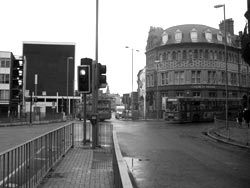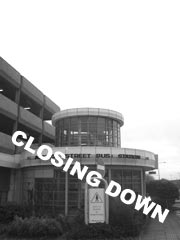
| HOME |
| NERVE |
| REVIEWS |
| ARCHIVE |
| EVENTS |
| LINKS |
| ABOUT US |
| CONTRIBUTORS |
| BACK ISSUES |
| CONTACT US |
Paradise Lost?
Who owns the streets of Liverpool? Until recently the question would have been as redundant as 'Who owns the air we breathe?' Common sense dictates that the streets where we all work, rest, and play belong to everyone and no one. But that was before the latest city centre redevelopment plans were announced.
By Adam Ford
 The
Duke of Westminster - Britain's richest man - is to buy 1 million square
feet of Liverpool, stretching from The Strand to Hanover Street, on a
250-year lease. The Paradise Street Development will see many buildings
currently in the area - such as the Friends' Meeting House and the Quiggins
complex demolished, to make way for a new upmarket shopping centre and
350 penthouses and flats. The new village will be enclosed within its
own boundaries, and will be policed by US-style 'quartermasters' or sheriffs.
The public will no longer have a legal right to walk through the streets
of what has - until now - been 'their' city centre, because those streets
will officially belong to the Duke's Grosvenor group and private businesses.
Anyone wishing to enter the area will therefore be a guest of the Duke,
and quartermasters will be allowed to remove 'undesirables' by force.
The
Duke of Westminster - Britain's richest man - is to buy 1 million square
feet of Liverpool, stretching from The Strand to Hanover Street, on a
250-year lease. The Paradise Street Development will see many buildings
currently in the area - such as the Friends' Meeting House and the Quiggins
complex demolished, to make way for a new upmarket shopping centre and
350 penthouses and flats. The new village will be enclosed within its
own boundaries, and will be policed by US-style 'quartermasters' or sheriffs.
The public will no longer have a legal right to walk through the streets
of what has - until now - been 'their' city centre, because those streets
will officially belong to the Duke's Grosvenor group and private businesses.
Anyone wishing to enter the area will therefore be a guest of the Duke,
and quartermasters will be allowed to remove 'undesirables' by force.
Reaction to the news has been mixed. Many people welcome the redevelopment itself, as there are many derelict buildings in the area. "Some places around here are a bit of an eye-sore", said Nicky, a shopper in School Lane, "so it's good that something's going to be done to clean them up". Steve from Kensington agreed, "the area around the Pier Head is disgusting, I'm not going to be sorry to see most of it go. But then we've been promised things in the past and they never happened". The civil liberties group Liberty, however, is just one of the dissenting voices campaigning against the plans. Their local spokesman, Barry Hugill, claimed it is "a very disturbing development" and that it "raises concerns as to whether a private police force is going to decide who can and cannot come into a public place." Donald Lee of the Open Spaces Society, which campaigns for increases in public access of way, said: "When I asked city council officials why the new routes could not be declared public rights of way, it was explained to me that the council and the developers needed to be in a position to 'control and exclude the riffraff element'." And for some, there lies the crux of the issue. Whilst many are concerned that famous cultural centres such as Quiggins will close - the complex claims to have raised as many as 150,000 signatures against the compulsory purchase order on its site - what lies at stake is nothing less than the heart and soul of the city centre. Private police, serving a private company's interests, may decide that the "riffraff element" includes anyone not shopping - anyone who cannot afford prices charged by the type of business the Duke wants to attract.
 Although
the scheme is the first of its kind in the UK, a similar development has
taken place in Los Angeles, California. In his book City of Quartz, Mike
Davis offers a view of the kind of "fortress" city LA has become,
and that Liverpool is arguably becoming. Describing street privatisation
as a "new class war . . . at the level of the built environment",
he illustrates in vivid detail how the shopping mall includes "a
high perimeter fence, video camera linked to motion detectors, a handful
of gated and monitored entry points, a security observatory, and a substation
of the LAPD". Inside this "pseudo-public space", "architectural
and semiotic barriers (are designed) to filter out 'undesirables'. They
enclose the mass that remains, directing its circulation with behaviourist
ferocity. It is lured by visual stimuli of all kinds, dulled by muzak,
sometimes even scented by invisible aromatisers".
Although
the scheme is the first of its kind in the UK, a similar development has
taken place in Los Angeles, California. In his book City of Quartz, Mike
Davis offers a view of the kind of "fortress" city LA has become,
and that Liverpool is arguably becoming. Describing street privatisation
as a "new class war . . . at the level of the built environment",
he illustrates in vivid detail how the shopping mall includes "a
high perimeter fence, video camera linked to motion detectors, a handful
of gated and monitored entry points, a security observatory, and a substation
of the LAPD". Inside this "pseudo-public space", "architectural
and semiotic barriers (are designed) to filter out 'undesirables'. They
enclose the mass that remains, directing its circulation with behaviourist
ferocity. It is lured by visual stimuli of all kinds, dulled by muzak,
sometimes even scented by invisible aromatisers".
The development has already got major backing from the rich and powerful. A number of businesses have signed-up, hailing it as the shot in the arm needed for shopping in Liverpool. Mike Wade-Smith - owner of the fashion company of the same name, claimed it would "make Liverpool much more competitive in attracting shoppers". The council argues that the scheme will create four thousand jobs. But perhaps this is confusing the issue. It is possible to redevelop Liverpool without taking away civil liberties, in fact it would surely work out cheaper without all the added security and barriers. For their own reasons the council, business, and the country's richest man are merely deciding not to.
Planning permission has been granted, and the scheme now awaits approval from Deputy Prime Minister John Prescott. But what kind of city centre do the people of Liverpool want for 2008 and the 246 years that will follow?
Seven things you didn't know about Liverpool's new landlord...
- The current Duke of Westminster - George Cavendish Grosvenor - is the 6th.
- The first Grosvenor male was made a baron in 1622, by James I.
- Queen Victoria created the title Duke of Westminster in 1874
- The Duke also counts the titles 'Marquess of Westminster', 'Earl Grosvenor', and 'Viscount Belgrave' amongst his collection.
- The Duke has topped the Sunday Times list as the richest person in the UK for many years - with a fortune estimated at £4.9 billion - almost £8.20 for every person in the country.
- Grosvenor has made most of his money from the property he already owns - approximately 300 acres of the most exclusive land in Central London - as well as his many country estates.
- Grosvenor has donated over £1 million to the Countryside Alliance